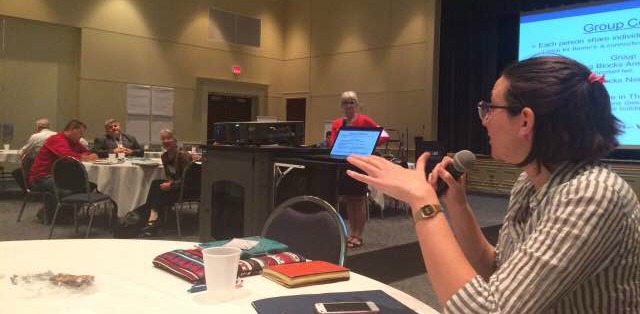News
 Once our mountains are destroyed by mountaintop removal coal mining, no one can put them back. But coal operators have a responsibility to clean up their mess. Otherwise our communities are left surrounded by toxic eyesores and polluted water.
Once our mountains are destroyed by mountaintop removal coal mining, no one can put them back. But coal operators have a responsibility to clean up their mess. Otherwise our communities are left surrounded by toxic eyesores and polluted water.
Bonding is the process by which coal companies provide financial assurance that they will reclaim the land they have damaged by mining. Currently, weak and inconsistent laws surrounding this practice put the public at risk of having to pick up the tab for the immense destruction of mountaintop removal and other damaging coal mining practices, while the coal industry keeps the profits.
The most irresponsible approach is called self bonding; when a coal company simply promises it will reclaim our land after mining. And if the company can’t clean up its mess? Then the taxpayer is left with the enormous burden of cleaning up the mess. Companies must be forced to set aside bonds for the full cost of reclamation.
We need you to comment today to protect our communities from the outrageous practice of self bonding.
The coal industry is laughing all the way to the bank, and we’re left with dirty water and unstable lands.
The Office of Surface Mining Reclamation and Enforcement is taking steps to limit self bonding �” and we need people like you to speak up to make sure the laws are as strong as possible.
Can you help us hold companies responsible to clean up their mess? Let’s get rid of self-bonding and demand full-cost bonding!
No comments yet » Leave your own...
 This week, nearly 40 mountain leaders are in Washington, D.C., to speak up to protect our water and reclaim our future �” and they need your help!
This week, nearly 40 mountain leaders are in Washington, D.C., to speak up to protect our water and reclaim our future �” and they need your help!
As the coal industry declines, thousands of jobs have been lost and millions of acres of land have been damaged. We’re excited about new policies that would clean up our land and create jobs, and we need you to join our work for a bright future for Appalachia!
We’re in D.C. to support the RECLAIM Act (H.R. 4456), a bill in the U.S. House of Representatives that would provide an immediate economic boost in communities struggling with the decline of the coal industry through the release of $1 billion to create opportunities reclaiming abandoned mine lands.
The RECLAIM Act is part of the White House’s POWER+ Plan, a proposed $10 billion initiative to assist communities that have historically relied on coal by growing and diversifying their economies.
These policies present an amazing opportunity for Appalachia �” but they won’t happen without your help! Sign the petition and join our fight to clean up coal’s toxic legacy of coal.
Appalachian communities have fueled America for more than 100 years. We are proud that our region is home to many rich assets, including our land, water, heritage and people.
But as you know, we have made great sacrifices to mine, transport and process the coal that powered the nation. Now it’s time to clean up the toxic legacy of coal that haunts so many of our communities, and create economic opportunities in those communities at the same time.
Sign our petition today and join the movement to reclaim Appalachia’s future.
No comments yet » Leave your own...
.jpg)
Come celebrate and enjoy live music, a silent auction and fundraiser, homemade Appalachian-inspired food and drinks, and a walk down memory lane!
The Alliance for Appalachia was formed in 2006 with the goals of ending mountaintop removal coal mining, halting other destructive coal technologies, and creating a just and sustainable Appalachia. We are a coalition of grassroots groups from across Appalachia, and you’ve seen our struggles and victories pass through your inbox hundreds of times over the years.
Time and again, you’ve offered the vital support needed to win important victories to protect our mountains. Now we want to thank you! You’re invited to our 10th Anniversary party in Washington, D.C., during our “Protect Our Water, Reclaim Our Future” lobby trip.
When: Tuesday, June 7 �” 6 – 9:00 p.m.
Where: Stewart Mott House �” 122 Maryland Ave NE, Washington, D.C. 20002
RSVP for the event on Facebook and share the page with your friends! Not on Facebook? You can learn more about the event on our website.
We are also having a celebration for our volunteers and members in Central Appalachia. If you can’t make it to D.C., or want to celebrate with us again, come to Hindman, Ky., on July 13th!
Can’t join us? We’ll sure miss seeing you. But you can still be a part of the action by donating to help support our next 10 years of taking action for the people and mountains of Appalachia.
No comments yet » Leave your own...

Remember “Sink-Sink,” the federal prison in Martin County, Ky., that’s slowly sinking into the earth because it was built on a former strip mine? Another Appalachian community might soon be facing this same form of “reclamation,” and they need your help fighting it.
The Federal Bureau of Prisons has proposed to build a $444 million maximum security prison on an old surface mine near Roxana, in Letcher County, Ky.
Tell the Bureau of Prisons that prisons are not good reclamation, and that the government should invest in communities, not incarceration.
After the government regulated strip mining in the early 1980s, this surface mine near Roxana was chosen by the Kentucky Department of Fish and Wildlife as a prime location for its deer restocking program.
Now, the Bureau of Prisons is proposing to build a maximum security prison on it. The Kentucky River will be impacted by sedimentation and excavated mine spoil, and up to 93 acres of endangered bat habitat will be cleared.
Tell the Bureau of Prisons: surface mines in Appalachia should not be used for building prisons.
In some communities, up to 25 percent of the land has been damaged by mountaintop removal coal mining. We need real reclamation, not boondoggle prisons that are unsafe for the community and unsafe for the people who would be incarcerated there.
As Letcher County resident Mitch Whitaker wrote in a recent op-ed, “This piece of property has already been imprisoned, and it’s just now getting back to the point of literal and figurative liberation. Why do it again?”
1 Comment » Leave your own...

This is your chance to officially tell the Obama administration to protect Appalachian streams.
The U.S. Department of the Interior has released a draft version of the Stream Protection Rule, which could be the most significant action taken to reduce the impacts of mountaintop removal coal mining on the region’s waterways. But we need it to be stronger, and that will only happen if the administration hears from thousands of advocates like you.
Add your voice to strengthen protections for Appalachian communities.
The Stream Protection Rule is intended to limit the dumping of toxic mountaintop removal waste into streams. We’ve been demanding these protections for almost eight years and are glad the Obama administration is finally taking action. But we need this rule to be stronger!
Appalachia’s economic future depends on sustainable communities and a healthy environment, and we can’t afford to let the coal industry weaken this proposed protection for the region’s waterways. It is more important than ever for you to add your voice in the fight against mountaintop removal.
Tell the Obama administration to finalize a strong rule that protects Appalachian streams and communities.
2 Comments » Leave your own...

We’ve been busy this month advocating for a strong Stream Protection Rule. Now we need you to speak up on another issue threatening Appalachia: toxic selenium pollution.
This element is leaching out of mountaintop removal valley fills in devastating amounts, causing deformities in fish and endangering the health of our streams and communities.
Take action now and tell the U.S. Environmental Protection Agency that it is unacceptable to weaken selenium standards and put clean water at risk.
The significance of the EPA’s decision on a new chronic selenium standard cannot be overstated. Selenium is toxic to fish and other wildlife at very low levels and is commonly found in wastewater from mountaintop removal mines. Once it is released into waterways, selenium enters the food chain and accumulates in fish, causing reproductive failure and deformities.
Officials in Kentucky have adopted, with the EPA’s approval, a standard with serious scientific flaws that does not sufficiently protect sensitive species. Without an enforceable federal limit, citizen monitoring and enforcement under the Clean Water Act will be seriously compromised.
The comment period ends on Oct. 10. Please take action today and tell the EPA to create a selenium standard that protects fish and people from the devastating impacts of mountaintop removal.
1 Comment » Leave your own...

The federal Office of Surface Mining has finally released a draft version of its long-awaited Stream Protection Rule, and is holding hearings across the region to hear from community members impacted by surface coal mining. We need your help to make sure this critical rule overcomes industry opposition.
Will you join us on Sept. 3 in Lexington to show the Office of Surface Mining that Kentucky supports clean water in the state and in central Appalachia?
The coal industry has spent years trying to stall the rulemaking process and prevent science-based protections for Appalachian streams. If it succeeds in weakening the rule, hundreds of more miles of streams would be threatened by mountaintop removal.
Appalachia’s economic future depends on sustainable communities and a healthy environment. It’s crucial that we demonstrate to the agency that we’re united in support of a strong Stream Protection Rule.
Join us on Sept. 3 to demand a rule that protects Appalachia’s land, streams and people.
Where: Lexington Civic Center
430 W Vine St. Lexington, KY 40507
When: 5:00 p.m. �” 9:00 p.m.
No comments yet » Leave your own...
Appalachia’s coal-bearing counties would directly benefit from the adoption of the POWER+ plan, a proposal in the Obama administration’s 2016 budget that would direct more than a billion dollars to Central Appalachia.
But last week, the U.S. Senate appropriations committee passed a budget bill the leaves out any mention of POWER+.
The U.S. House budget leaves Virginia entirely out of the forward-thinking Abandoned Mine Lands funding reforms that were spelled out in the POWER+ Plan. That component of the plan would send $30 million directly to the Virginia coalfields for economic development and put laid-off miners back to work cleaning up the messes left by coal companies.
Please contact your senators now to make sure they support a budget that includes a path forward for Appalachian communities.
For more background, we recommend this piece by Naveena Sadasivam for InsideClimate News, which details the curious quiet around POWER+ and how the plan has been pulled into the partisan bickering that’s embroiled the U.S. Environmental Protection Agency’s Clean Power Plan and the 2016 budget process as a whole.
Under the federal Abandoned Mine Lands program, sites that pose a threat to safety are prioritized over sites that offer a potential economic benefit if cleaned up. While this program has reduced potential hazards in the coal-mining regions of Appalachia and the U.S., it has done little to positively impact local economies.
The POWER+ Plan, however, calls for funds to be used for projects that not only improve the environment and reduce hazards, but also create an economic benefit for local economies.
There’s still time for both House and Senate to include the meaningful funding proposals outlined in POWER+. But in order for that to happen, we need to the Senate to hear a clear message that Appalachia deserves this much-needed funding!
Please contact your senators now to make sure they support a budget that includes a path forward for Appalachian communities.
No comments yet » Leave your own...

CLICK on the image to sign the petition!
Jim Justice – target of the regional Justice to Justice campaign, recently expressed interest in becoming governor, much to the dismay of the thousands who have been cheated out of wages by Justice bad business practice, or had their communities damaged by outlaw mines he owns.
As Tom Torres, an activist with the Justice to Justice campaign and the group Hands Off Appalachia, says in this Grist article, “He has this public persona as a down-home charitable member of the community, and at the same time he owes millions of dollars to unpaid contractors and all these state and federal agencies for labor violations and environmental violations and safety violations.”
Sign this petition against Jim Justice‘s bad actions here to join the campaigning for him to clean up his mess and pay off his debts.
No comments yet » Leave your own...
Article by Gabby Gilliespie, Southwest Virginia oganizer with the Sierra Club Beyond Coal Campaign
Last week, citizens from across Appalachia attended a listening session hosted by the Appalachian Regional Commission in Morehead, Kentucky. With the provisions proposed by Obama for the 2016 budget, organizers in Appalachia are attempting to create a groundswell on many levels that will push local leaders to make good decisions for the future of Appalachia. A part of these provisions, known as the POWER+ Plan, include a proposed $25 million in funding to the Appalachian Regional Commission (ARC). As many know, the ARC has a lot of influence when it comes to economic development in the region. They have been a part of shaping conversations and building partnerships for the past fifty years. As a young citizen of Appalachia, I believe it is important for as many of us as possible to participate when ARC hosts listening sessions and public forums, so that our voices are heard and our ideas are propelling these conversations forward.

Ada Smith, of Appalshop and The STAY Project, speaks
The ARC scheduled five listening sessions across Appalachia to gather public input on their 2016-2020 Strategic Plan. Before hosting these events, the ARC put together a study detailing the impacts of the initiatives put in place by their organization over the past fifty years. These listening sessions are the next step in the process towards creating a strategy that includes the input of citizens, leaders, and representatives from varied sectors that will be impacted by the work of the ARC.
Carol Judy from the Clearfork Valley in Tennessee said, “At the Morehead meeting there was a significant presence of youth who shared and participated, creating an intergenerational sharing of solutions and issues,” and the question she has moving forward is, “where is the youth of ARC?” Coming out of this session, I also heard a lot of questions about how citizen input was meant to be incorporated. How much sway do our ideas truly have on the strategic plan?
The structure of the listening session began with a welcome and briefing about the strategic plan, as well as the findings from the Executive Summary mentioned above and located at this link, entitled “Appalachia Then and Now: Examining Changes to the Appalachian Region Since 1965.” After these presentations, the facilitation team asked participants to get into groups and share their understandings of opportunities to strengthen the economies in their communities. In that same session folks were asked to discuss the specific barriers they see to advancing those opportunities. People were given space to share within their small groups, and also share out to the entire assembly the things that resonated during their conversations. In the next session the questions involved the building blocks and resources people felt they had in their communities and which building blocks were lacking or needed strengthening.
Kendall Bilbrey, a young citizen from Southwest Virginia felt that, “Folks seemed to be comfortable with solutions-based conversations without getting caught up in political arguments,” and believes that these conversations are vital to moving our region forward to work together toward just transition.
We have seen a lot of progress on this front in Central Appalachia over the past five years. It seems that more and more citizens every day are willing to let the “coal is our future” rhetoric fall to the wayside and are far more open to talk about new economic opportunities in the region. Many folks in the groups I engaged in at the event wanted to see more spaces for sharing intergenerational knowledge and skills, as well as seeing much more youth engagement.
Overall, I believe events like the ARC listening sessions are a good opportunity for communities across the region to come together and share ideas for the future as well as discuss issues concerning the roles organizations have and should play in shaping the economic landscape of Appalachia.
To learn more about these listening sessions, visit the ARC website.
No comments yet » Leave your own...
 Once our mountains are destroyed by mountaintop removal coal mining, no one can put them back. But coal operators have a responsibility to clean up their mess. Otherwise our communities are left surrounded by toxic eyesores and polluted water.
Once our mountains are destroyed by mountaintop removal coal mining, no one can put them back. But coal operators have a responsibility to clean up their mess. Otherwise our communities are left surrounded by toxic eyesores and polluted water.









.jpg)







